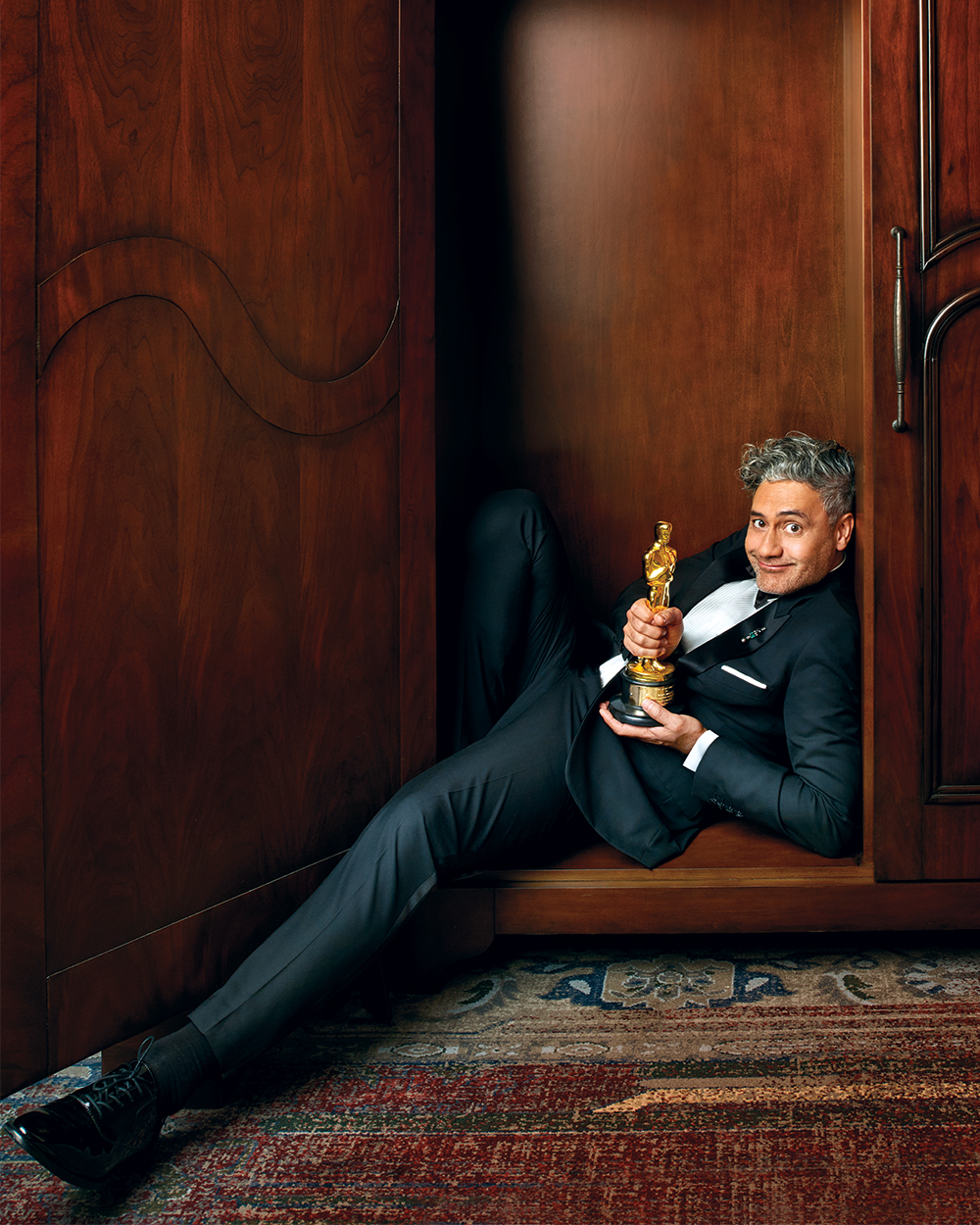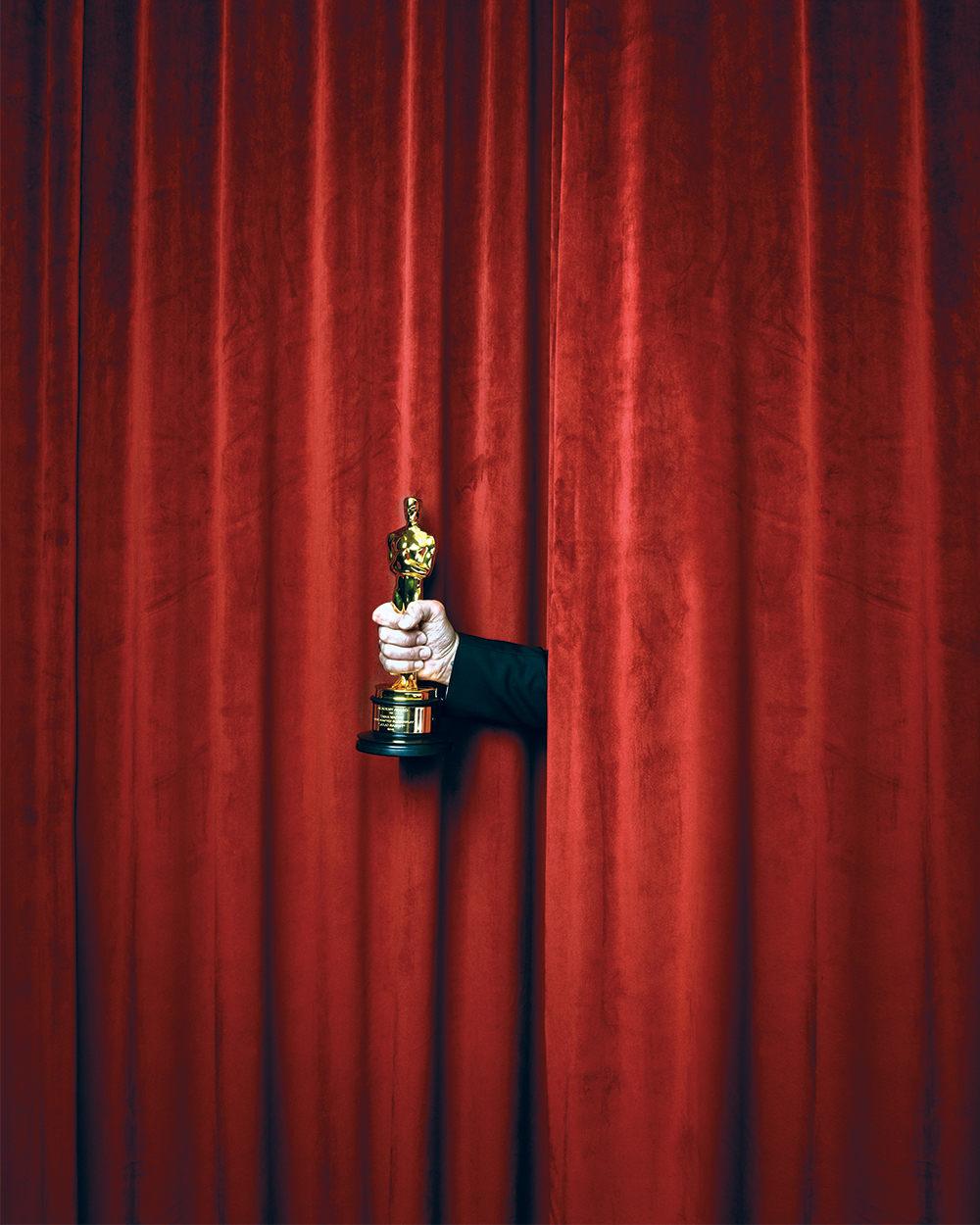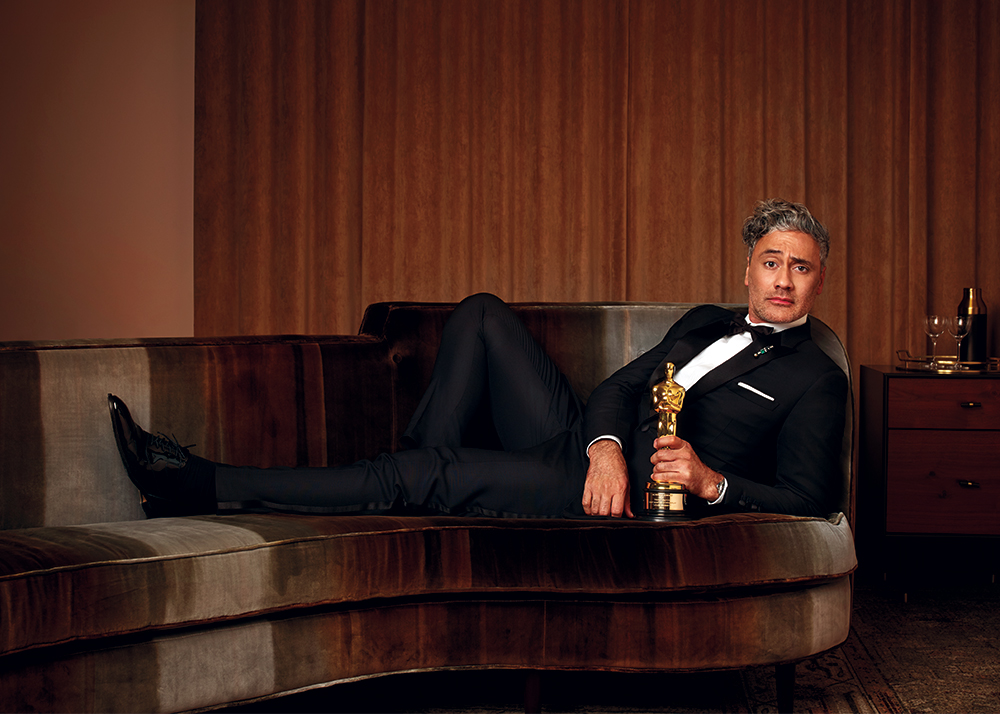Taika Waititi on Oscars, His ‘Jojo Rabbit’ Journey and Those ‘Star Wars’ Rumors
By Kate Aurthur
LOS ANGELES (Variety.com) – The morning after the Academy Awards, Taika Waititi — the winner of the adapted screenplay Oscar for “” — is drinking a Pedialyte. But however hungover the filmmaker might be, it does not stop him from hamming it up for a photo shoot. He writhes on a hotel room couch, folds himself into an armoire and holds out his Oscar with a look of mock terror on his face, as if he’s warding off a vampire with a cross.
“Jojo Rabbit,” loosely based on Christine Leunens’ 2008 novel “Caging Skies,” tells the story of Johannes Betzler, a sensitive 10-year-old boy (Roman Griffin Davis) in late-World War II Germany. Though he has conjured Adolf Hitler (Waititi) as an imaginary friend, his Nazi aspirations do not match his true character. In fact, he gets his nickname when older Hitler Youth kids pressure him to strangle a bunny, and he can’t. Jojo’s fascistic fervor is tested when he discovers that his mother, Rosie (Scarlett Johansson), has been hiding a Jewish girl, Elsa (Thomasin McKenzie), in a crawl space in their house. Rosie believes in her son, and tells him “love is the strongest thing in the world.” As it turns out, she’s right.
“Jojo Rabbit” is a farce, a provocation and a coming-of-age tale about a child grappling with the evils of Nazism.
Over six features, Waititi, 44, has built a career as a writer, director and actor, toggling between indie films (2016’s “Hunt for the Wilderpeople”) and mainstream studio fare (2017’s “Thor: Ragnarok”).
“Thor” star Chris Hemsworth — who will soon work with Waititi again in “Thor: Love and Thunder” — notes to Variety by email that “being on a set with Taika never feels like work.” He explains that Waititi applies the same principles he uses in his smaller films to a big-budget movie like “Thor,” concentrating on “character, heart, humor, story. … The special effects and massive stage somehow don’t seem to distract him. There’s a purity to his focus and intention that’s unshakable.”
Waititi also has some notable quirks — for example, he naps at least once a day. “Jojo Rabbit” producer Carthew Neal, Waititi’s partner at Piki Films, says he schedules them into production. “I know that I need to put in a 20-minute nap around lunchtime,” Neal says. “And then it’s like he’s started a new day in the afternoon! He does have endless energy.”
Waititi needed that energy during this grueling, truncated awards season. With the Oscars ceremony moved up, campaigning took place at hyperspeed, and the nominations were marred by who wasn’t recognized — namely, actors of color and women directors. Those failings were somewhat mitigated on Oscar night when Bong Joon Ho’s “Parasite” became the first non-English language film to win best picture as well as international feature, and Waititi — of Maori descent — took home a top writing award.
After the Variety cover shoot at h Club in Hollywood is over, Waititi talks about his “Jojo Rabbit” journey and what’s to come. Then he disappears into one of the hotel bedrooms. It’s nap time.
During your speech, you dedicated your win to the indigenous kids of the world. When did you decide to do that?
I’ve been thinking about it for a while. Growing up in New Zealand, dancing and doing art — these things were frowned upon, or seen as weird behaviors. It’s changed a lot, but there’s still pockets in New Zealand and around the world of kids who think they need to give up storytelling, or give up being creative.
I wanted to try and communicate to kids who grew up like I did, or are growing up like I did. To say to them, it’s OK to want to be an artist.
What’s it been like as a brown person working in Hollywood?
Because I’m from New Zealand, people find it kind of charming. They think, “Oh, those quirky people with those weird accents!” I don’t think they see us as brown people. I don’t think when Maori come to America, they see us in the same light as Mexicans or Hispanics. I’ve never felt prejudice toward me here in L.A., even though I know it exists. I’m probably lucky I have a weird accent!
What did you think of all the “Parasite” wins?
I was so happy. The fact that it’s the first movie to win foreign film and best picture is incredible. I love Bong Joon Ho so much. “Memories of Murder” is on my top-five list when I talk about films I love.
“Jojo Rabbit” was on The Black List in 2012, but it took a long time for you to get it made. Now that you’ve won this Oscar, how do you look back on the road from writing the movie to now?
It’s the only script where I’ve started from page one and written all the way through to the end. Usually I start with the end, and then try to take a stab at the beginning. Then I’ll find some places in the middle. But this one, I went from page one all the way through. I feel like I was kind of helped in some way. People talk about being influenced by the muse or something. But this thing sort of happened so fast. I think I wrote it in a couple of weeks. I didn’t feel stressed about it. It just flowed out. I don’t know how to explain it.
There’s no Hitler-as-imaginary-friend in the book. Why is Hitler so important to the story?
I just thought, I’ll take that story and add Taika-isms. And if I want to show a kid conflicted between two sides of his conscience, how can I do that? I don’t want to show shots of him like most filmmakers do, walking through wheat fields. There might be a smarter way to show how his conscience manifests itself.
So the character of Hitler was a Taika-ism?
Yeah. It wasn’t something I was really trying to develop. It just started happening as I was writing.
In a Ted Talk you gave in 2010, you spoke about your childhood obsession with drawing swastikas, and then with painting Hitler mustaches and hair onto other objects. Was the Hitler character a case of you putting your youthful interests into your filmmaking?
Maybe! If you’re told something’s bad, if you’re told not to do something, usually you end up doing that. If people tell you not to draw a swastika, at some point when you’re alone in your room, you do it just to see what it’s like. And then you’ll feel really guilty, which is what I did. I’d change it to a window, or scribble it out. Maybe that’s something that leaked into the film.
There’s a scene when Rosie and Elsa are talking about Jojo’s fanaticism, and Rosie says she knows her son is in there somewhere. To me, it was one of the more jarring moments to see today, because the world we’re living in right now feels so wrong to me a lot of the time — yet I feel like the world I thought I knew must be in here somewhere.
Isn’t that so weird, though? You know the world is good. You know inherently human beings are good. But even driving to the awards yesterday afternoon, we came up Highland and there were all these Trump supporters who were screaming at us and flipping us off. And screaming, “Four more years! Four more years!” Coming up Highland!
I was just looking out the window and thinking, “Oh, my God!” It takes a lot of effort to get out of bed and go down to Highland and wait for black SUVs to drive past and tell people who work in the movie industry that they’re evil and that gays should go to hell. That’s a lot of effort! So some part of me feels like, “If they’re going to make that much of an effort, I might as well make an effort as well.” It’s too easy to think, “Oh, well — they’re dummies. I won’t do anything about it.” I think that’s what they rely on.
Backstage, you talked about how Nazis are basically just a fact of life now. How did we get here?
It’s insane. I lived in Germany in the late ’90s, and at that point there were right-wing neo-Nazi political parties. At what point did this change, and how did we suddenly forget the rules? If you hate another race, you are a bad person.
Do you think criticism of the movie would have been more muted if you still went by Taika Cohen and people knew you were Jewish?
Yeah! They did a press screening with a lot of Jewish press, and a lot of the comments were “I wish we’d known that he was Jewish before we’d watched the movie.”
It feels almost like buying into it, if you start considering the fact that you might have to put on the poster: “Don’t worry, the director’s Jewish!” Or: “I know how you’re feeling. Just watch it.”
Disney bought Fox Searchlight as you were finishing “Jojo Rabbit.” Were you ever worried about this being released by Disney?
No. We’d already shot; we were editing; we’d gotten notes from Searchlight. Those guys were fine with it. I heard a thing: “Someone from Disney’s nervous about ‘Jojo Rabbit.’” I suspect that’s a lie. Because the people who’ve run Disney have always been very supportive. They’ve watched the film, and they love it.
My intention was always to make the film PG. I used one f-bomb.
When is the one f-bomb?
“F— off, Hitler,” when he kicks him out the window. I wanted it to be more accessible for young people and teenagers.
This was your first major Oscar campaign. How was the experience for you?
It’s more stressful than making a movie. At least when you’re making a movie, every day is different. It is what it is: It’s a campaign. By the end of it, if someone had handed me a baby, I would have totally taken a photo with it and kissed it.
What stage are you in with your next movie, “Next Goal Wins”?
Just the editing. I think we’re going to take our time with that one, and deliver it for the end of the year.
Is it also an awards movie?
It’s more of a comedy. It’s probably pretty presumptuous of me to suggest that this film is anything like “Intouchables” [the 2011 French movie directed by Olivier Nakache and Éric Toledano] but that was a film I was really inspired by — people crossing cultural boundaries. Just making films that are uplifting! Life is depressing enough, sometimes, in the day to day.
There’s so much excitement about the Natalie Portman of it all in the next “Thor.” How closely are you going to hew to the comics? Is her character Jane Foster going to have cancer in it?
We don’t know. That comics run was a big inspiration, and was an influence on the first few drafts. But at Marvel, we always change everything. I could say one thing right now, and in two years, it will be the complete opposite — or that thing won’t exist. We continue writing even in post-production.
Based on what Marvel wants?
Based on what the audience wants. We test the film. We shot for two weeks on “Thor” with our pickups. There were huge, huge character changes, huge story changes. We reshot entire scenes. I think that’s why they do good work. They’re relentless in their pursuit of just a good movie.
You don’t mind doing reshoots?
I’ve done reshoots on every single movie I’ve done. I actually build it into my budgets. I like reshoots. No shame about going and fixing it.
Would you like for Tessa Thompson’s Valkyrie to be explicitly queer in this next movie?
I think so. The IP is not mine. But with the actors, I feel whatever makes them comfortable — whether they feel like there’s a natural choice, or a natural way for that character to go — then I’m pretty supportive. If Tessa wanted to do that, I’m in.
Just by working on “The Mandalorian,” you’ve landed squarely in the future of “Star Wars” conversation. Where does that stand now?
I wish there was a better story, I’ll put it that way. Are there discussions about the “” film? Like, yeah, I discussed with my friends in 1996 how cool “Star Wars” was. That’s what they’re going off.
Really, there’s nothing happening?
I think people see me hanging out with people, especially with “Star Wars,” and think I’m having some big discussions about it. I would f—ing love to.
You would want to do a “Star Wars” movie.
If it was right. I would want to do any kind of movie if it made sense, and if it felt not like career suicide.
What’s happening with the live-action remake of “Akira”?
The whole thing went on hold. We had to keep pushing the dates, and it encroached on the “Thor” dates, which were immovable. So “Akira” ended up shifting two years down the track.
Post-“Thor”?
Post-“Thor.” So I’m not sure if even in two years I’d be — I don’t know what I’m doing in f—ing two days.
It may not happen, you mean?
I think eventually it will happen. I’m just not sure if I’ll be doing it.
When you look at the movies you’ve made, what’s the through line that connects them?
They’re about family. My earlier films were about dads. I’m moving into my mum phase now. What I love about families is that no matter where you’re from, everyone has got the same dynamic. You’ve got heroes; you have villains. You’ve got those two grumpy dudes from the Muppets — the uncles and the aunties who know everything and bitch and whine. You’ve got the Greek chorus. You’ve got every dynamic and every stereotype in families. That’s why I keep going back to them. It’s an endless source of entertainment for me. My family is so f—ing hilarious. And I’m always stealing their stories and putting them in movies.
Photos by Andrew Eccles for Variety; photographed at the H Club Los Angeles



